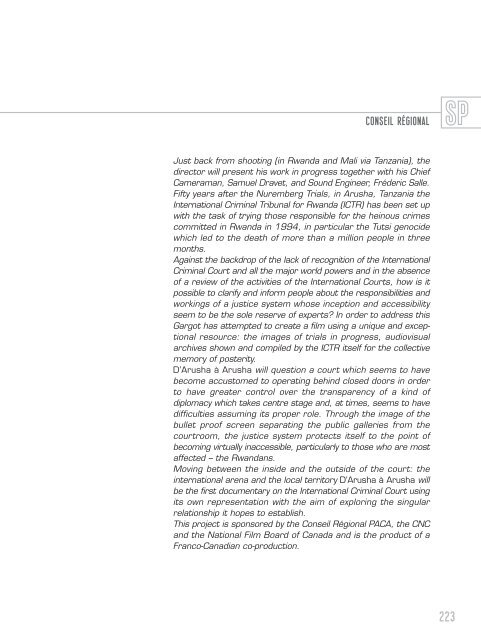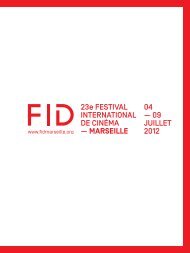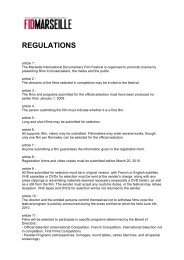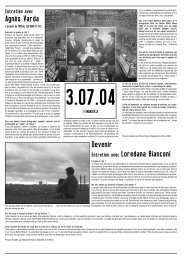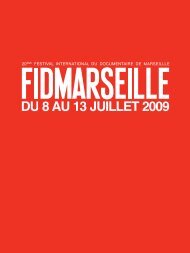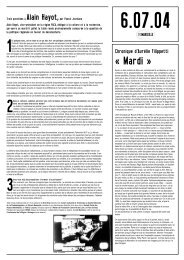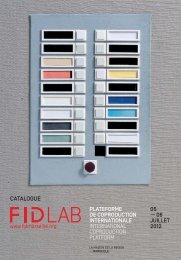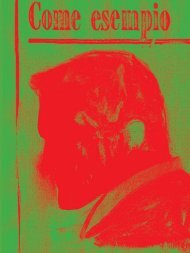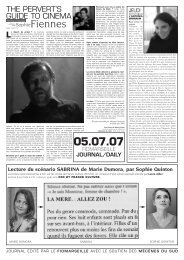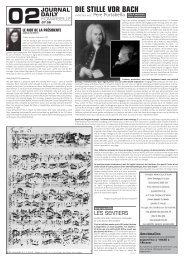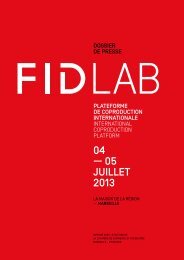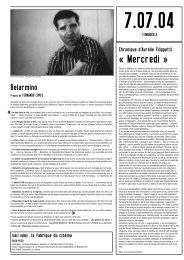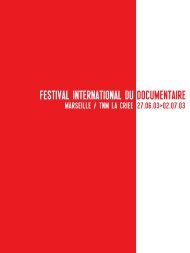- Page 3 and 4:
SOMMAIRE/CONTENTSSPARTENAIRES/PARTN
- Page 5 and 6:
Le Festival International du Docume
- Page 7 and 8:
AURÉLIE FILIPETTIPRÉSIDENTE DU CO
- Page 9 and 10:
JEAN-CLAUDE GAUDINMAIRE DE MARSEILL
- Page 11 and 12:
MICHEL VAUZELLEPRÉSIDENT DE LA RÉ
- Page 13 and 14:
CHRISTINE ALBANELMINISTRE DE LA CUL
- Page 15 and 16:
VÉRONIQUE CAYLADIRECTRICE GÉNÉRA
- Page 17 and 18:
JEAN-NOËL GUÉRINISÉNATEUR, PRÉS
- Page 19 and 20:
RICHARD BOIDINDIRECTEUR DE L’AUDI
- Page 21 and 22:
OLIVIER MILLEPRÉSIDENT DE LA COMMI
- Page 23 and 24:
BÉNÉDICTE CHEVALLIERDÉLÉGUÉE G
- Page 25 and 26:
FRANCK GABRIELDIRECTEUR DE LA COMMU
- Page 27 and 28:
JEAN-FRANÇOIS MATTEICONSEILLER MUN
- Page 29 and 30:
BERNARD FAVIERPRÉSIDENT DU GNCRÉD
- Page 31:
PRIXAWGrand Prix de la Compétition
- Page 35 and 36:
APICHATPONG WEERASETHAKULRéalisate
- Page 37 and 38:
ANGELA SCHANELECRéalisatrice / Fil
- Page 39 and 40:
ENRICO GHEZZIRéalisateur / Film Di
- Page 41 and 42:
JEAN ECHENOZÉcrivain (France)JURY
- Page 43 and 44:
NATHALIE RICHARDComédienne / Actre
- Page 45 and 46:
JÉRÔME BEAUJOURScénariste / Scri
- Page 47 and 48:
MANOUSHAK FASHAHIRéalisatrice / Di
- Page 49 and 50:
GILLES LAURENTIngénieur du son / S
- Page 51 and 52:
PATRICE NEZANProducteur / Producer
- Page 54 and 55:
CÉDITORIALEighteenth Festival, eig
- Page 58 and 59:
LOVE CONQUERS ALLRETURN OF THE POET
- Page 60 and 61:
AUTOHYSTORIAréalisé par / directe
- Page 62 and 63:
DE SON APPARTEMENTTO HIS APARTMENTS
- Page 64 and 65:
GHIRO GHIRO TONDOréalisé par / di
- Page 66 and 67:
HOréalisé par / directeb byGAËLL
- Page 68 and 69:
JOURNAL N O 1RETURN OF THE POET / L
- Page 70 and 71:
MOSTRAMEMONTRE MOI / SHOW MEréalis
- Page 72 and 73:
RUE SANTA FÉréalisé par / direct
- Page 74 and 75:
THE HALFMOON FILESréalisé par / d
- Page 76 and 77:
THE PERVERT’S GUIDE TO CINEMARETU
- Page 82:
Sachez toutavant tout le monde !Cha
- Page 86 and 87:
Sablé-sur-Sarthe, Sarthe, de Paul
- Page 88 and 89:
1. ORAKEL (Orakel von Prohlis), de
- Page 90 and 91:
The halfmoon files, de Philip Schef
- Page 92 and 93:
Journal n°1, de Hito SteyerlTentat
- Page 94 and 95:
Cène, de Andy Guerif
- Page 96 and 97:
Hic Rosa, partition botanique, de A
- Page 98 and 99:
Des Indes à la planète Mars, de C
- Page 100:
The Pervert's Guide to Cinema, de S
- Page 104:
La Fondation d’entreprise Ecureui
- Page 107 and 108:
CÈNEréalisé par / directeb byAND
- Page 109 and 110:
FRANCE 2007réalisé par / directeb
- Page 111 and 112:
HIC ROSA, PARTITION BOTANIQUEréali
- Page 113 and 114:
MAFROUZA - OH LA NUIT!réalisé par
- Page 115 and 116:
NAWNA (JE NE SAIS PAS...)réalisé
- Page 117 and 118:
TRABALHO ESCRAVOréalisé par / dir
- Page 122 and 123:
MICHEL TREGAN
- Page 124 and 125:
MICHEL TREGANabsolument, et quand i
- Page 126 and 127:
MICHEL TREGAN11 ans, est l’objet
- Page 128 and 129:
MICHEL TREGANthe immensity of his w
- Page 130 and 131:
MICHEL TREGAN“Juventude em marcha
- Page 132 and 133:
CASA DE LAVARÉTROSPECTIVE PEDRO CO
- Page 134 and 135:
NO QUARTO DA VANDAMICHEL DANS LA TR
- Page 136 and 137:
OÙ GIT VOTRE SOURIRE ENFOUI?ONDE J
- Page 138 and 139:
NE CHANGE RIENMICHEL TREGANRÉTROSP
- Page 140 and 141:
MICHEL TREGANRÉTROSPECTIVE PEDRO C
- Page 142 and 143:
BILLIE HOLIDAY CHANTE “FINE AND M
- Page 144 and 145:
OS VERDES ANOSMICHEL VERTES TREGAN
- Page 146 and 147:
JAIMEMICHEL TREGANréalisé par / d
- Page 148 and 149:
UNKNOWN CHAPLINMICHEL TREGANréalis
- Page 150 and 151:
MICHEL TREGANÉcranPresto se dépli
- Page 152 and 153:
MICHEL TREGANScreenPresto divides i
- Page 154 and 155:
DAMO SUZUKI, LE CHANT DE L’IMPREV
- Page 156 and 157:
HOMEMADEMICHEL LA MAQUETTE TREGANr
- Page 158 and 159:
OPERA JAWAMICHEL TREGANréalisé pa
- Page 160 and 161:
MICHEL TREGANPRESTO / A TEMPOIn the
- Page 162 and 163:
TONITE LET’S ALL MAKE LOVE IN LON
- Page 164 and 165:
AU FIL DU SON - UN PORTRAIT DE YANN
- Page 166 and 167:
D. O. A.MICHEL TREGANréalisé par
- Page 168 and 169: MICHEL TREGANPRESTO / DA CAPOImages
- Page 170 and 171: SUFFERING AND SMILINGMICHEL TREGANr
- Page 172 and 173: MICHEL TREGANThe proposition is a v
- Page 174 and 175: HÔTEL MONTEREYMICHEL TREGANréalis
- Page 176 and 177: DIE LEERE MITTETHE EMPTY CENTREréa
- Page 178 and 179: CHACUN SA PALESTINEMICHEL EVERYBODY
- Page 180 and 181: IMAGO MUNIDI. DAS GÜLTIGE, SAGBARE
- Page 182 and 183: KURZ DAVOR IST ES PASSIERTMICHEL IT
- Page 184 and 185: PASOLINI PA* PALESTINEMICHEL TREGAN
- Page 186 and 187: MICHEL TREGAN
- Page 188 and 189: MICHEL TREGANRevolver is a magazine
- Page 190 and 191: SCHLÄFERMICHEL SLEEPERTREGANréali
- Page 192 and 193: MICHEL TREGANImagine the following
- Page 194 and 195: DAS MODELLLA MAQUETTEréalisé par
- Page 196 and 197: JEUNES LUMIÈRESMICHEL TREGANréali
- Page 198 and 199: PAULMICHEL TREGANréalisé par / di
- Page 201 and 202: Das Modell, de Florian GwinnerJaime
- Page 203 and 204: Au fil du son, un portrait de Yann
- Page 205 and 206: Unfaithfully yours, de Preston Stur
- Page 207 and 208: Performing the border, de Ursula Bi
- Page 209 and 210: Arcana, de Cristobal Vicente Contai
- Page 211 and 212: Black sea files, de Ursula Biemann
- Page 213 and 214: Anthem, de Apichatpong Weerasethaku
- Page 215 and 216: Igor Stravinsky, composer, de Janos
- Page 217: Le goût des olives, de Anne Lacour
- Page 225 and 226: GAMBITréalisé par / directeb bySA
- Page 227 and 228: THE LAST MOVIEréalisé par / direc
- Page 230: TABLES RONDES / ROUND TABLESTABLE R
- Page 233 and 234: Monday July 2 to Friday July 13, 20
- Page 235 and 236: An exhibition of work by Mariusz Gr
- Page 237 and 238: PETER FRIEDL, TRAVAIL 1964-2006PETE
- Page 239 and 240: PHILIPPE GRANDRIEUX:INSTALLATIONS,
- Page 241 and 242: RENCONTRES: UN FILM, UN RÉALISATEU
- Page 244 and 245: MICHEL TREGANVIDÉOTHÈQUE / VIDEO
- Page 246 and 247: MICHEL TREGANVIDÉOTHÈQUE / VIDEO
- Page 248 and 249: MICHEL TREGANVIDÉOTHÈQUE / VIDEO
- Page 250 and 251: MICHEL TREGANVIDÉOTHÈQUE / VIDEO
- Page 252 and 253: MICHEL TREGANVIDÉOTHÈQUE / VIDEO
- Page 254: MICHEL TREGANVIDÉOTHÈQUE / VIDEO
- Page 257 and 258: REMERCIEMENTS / ACKNOWLEDGEMENTSJEA
- Page 259 and 260: INDEXINDEX DES FILMS / INDEX OF FIL
- Page 261 and 262: INDEXCONTACTSI.Mille et une. FilmsT
- Page 263 and 264: INDEXCONTACTSIEchakhch Latifa (à c
- Page 265 and 266: INDEXCONTACTSIPierre Grise Distribu


